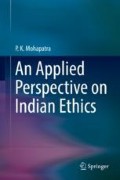Abstract
This chapter continues the critical, reconstructive analysis on the traditional theory of niskama karma. Indian value system is entrenched upon a supposed logical trilogy comprising three interdependent beliefs – karma, transmigration and moksa – each belief putatively explainable only in association with the other two. But interestingly, while transmigration is essential to karma, moksa requires cessation of transmigration and so the cessation of karma (to experience whose results one has to be born again). That is why the karma that is required for moksa is niskama karma, which being desireless would produce no effects to be experienced in any life. In this sense niskama karma virtually renders the law of karma inoperative! But, we ask, is it not incoherent to claim that one ought to engage in niskama karma for attaining moksa and yet not to desire moksa that would inevitably result? Will it be immoral for a mumuksu to have mumuksa or even for a jivanmukta to work for nihshreyasa? Then why this emphasis on niskama karma? Reason: proneness for absolutism – absolute obligation to experience the desired result; the assumption that every desire is bondage- causing and every sakama karma is evil. In virtually putting a blanket ban on desires and attachment for any consequence of actions, the niskama karma theory in the received sense prescribed an absolute requirement for itself and thereby puts severe constraints on its success.
We claim that the ideal of niskama karma does not mean that desirelessness is an absolute requirement for moral actions. The Gita conception of non-attachment in action, not for action, is brought in to justify our reinterpretation of the theory.
Access this chapter
Tax calculation will be finalised at checkout
Purchases are for personal use only
Notes
- 1.
Non-attachment and desirelessness are usually used as synonymous, and I am so using these words, particularly in the context of niskama karma. Rajendra Prasad has convincing reasons for treating them as such. See ibid, chaper 13, Sections 2 and 3.
- 2.
Hiriyanna said this for a different purpose, i.e. to avoid fatalism. But I am not concerned so much to show that as to show the violability of the law of karma . It is violable (i.e. preventable) by efforts and endeavours. Bhartrhari stressed on this by saying, ‘…put forth your best efforts to secure what you want. The blame will not be yours if you fail’ (Cited by Hiriyanna, ibid, p. 186.). The last is only to reiterate that efforts, very much like karma, are only a cooperative element in effecting a result, which depends on much else besides these.
References
Bhoi, B. (1989). Stuti Chintamani (Odia). Cuttack: Dharmagrantha Store.
Brink, D. (1989). Moral realism and the foundations of ethics. New York: Cambridge University Press.
Dancy, J. (1993). Moral reason. Oxford/Cambridge: Blackwell.
Hiriyanna, M. (1957). Indian conception of value. Mysore: Kavyalaya.
Hiriyanna, M. (1932). Outlines of Indian philosophy. London: George Allen and Unuwin.
Hopkins, E. W. (1924). Ethics of India (p. 116). New Haven: Yale University Press.
McKenzie, J. S. (1922). Hindu ethics. Oxford: Oxford University Press.
Mohapatra, P. K. (1999). Personal identity (2nd ed., pp. 154–155). New Delhi: Decent Books.
Mohapatra, P. K. (2008). Ethics and society: An essay in applied ethics. New Delhi: Concept Publishing Company.
Nagel, T. (1986). The view from nowhere. Oxford: Oxford University Press.
Prasad, R. (1989). Karma, causation and retributive morality. New Delhi: ICPR.
Author information
Authors and Affiliations
Rights and permissions
Copyright information
© 2019 Springer Nature Singapore Pte Ltd.
About this chapter
Cite this chapter
Mohapatra, P.K. (2019). Niskama Karma: A Critical Assessment. In: An Applied Perspective on Indian Ethics. Springer, Singapore. https://doi.org/10.1007/978-981-13-7503-3_8
Download citation
DOI: https://doi.org/10.1007/978-981-13-7503-3_8
Published:
Publisher Name: Springer, Singapore
Print ISBN: 978-981-13-7502-6
Online ISBN: 978-981-13-7503-3
eBook Packages: Religion and PhilosophyPhilosophy and Religion (R0)

